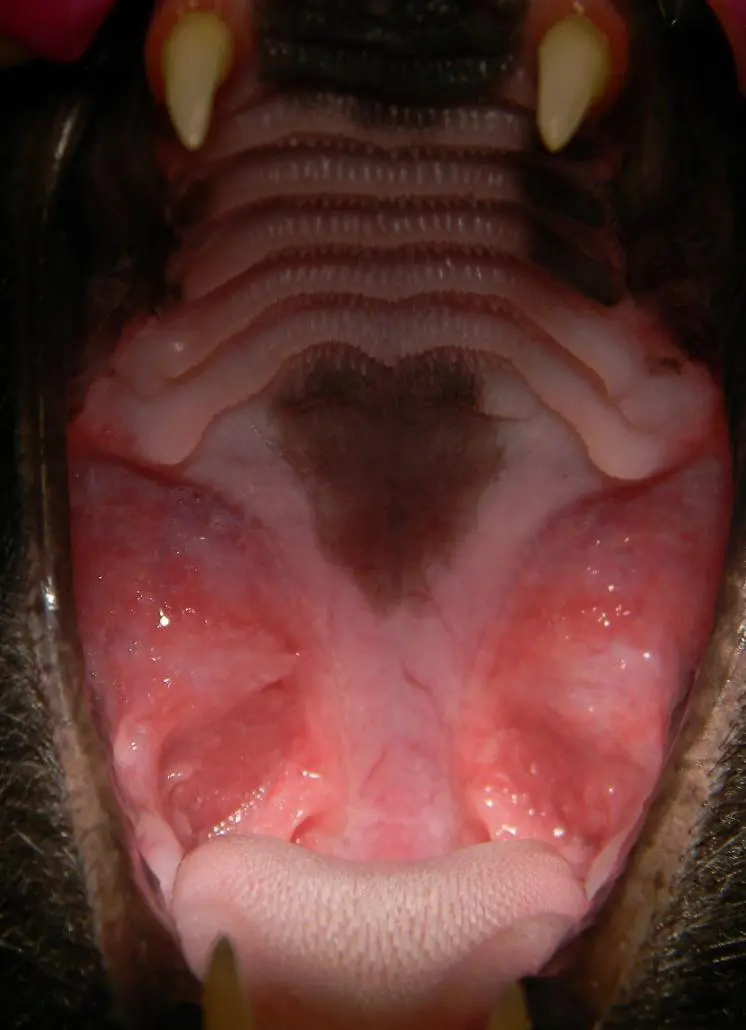
23 Feb Diagnosing and Treating Feline Stomatitis
What is this Painful Feline Dental Disease?
Stomatitis refers to widespread inflammation in the mouth. “Stoma” means opening, and “itis” means inflammation. In cats, inflammation most notably in the caudal (back part) of the oral cavity (oropharynx) is commonly referred to as stomatitis or caudal oral stomatitis. Perhaps the most appropriate medical term for this condition is feline chronic gingivostomatitis.
Stomatitis is an extremely painful oral condition in cats. It is an overzealous reaction of the immune system to plaque accumulation on the surface of teeth. The caudal region of the oral cavity becomes red and ulcerated with thickened tissue. The pain associated with this severe inflammation makes it a challenge for cats to eat and enjoy a good quality of life. Imagine the worst sore throat you can have magnified one hundred times! Additionally, cats spend a good portion of their day grooming. A painful mouth limits a feline from engaging in this essential behavior, negatively affecting their quality of life.
Factors that can predispose a cat to stomatitis include retroviral diseases such as Feline Immunodeficiency Virus (FIV), and Feline Leukemia Virus (FeLV). Additional causes may include Calicivirus, Juvenile Onset Periodontitis, periodontal disease, and genetics.
The Clinical Signs of Stomatitis in Cats Include
- Halitosis or bad breath
- Growling at food
- Drooling
- Inappetence
- Weight loss
- Decreased grooming
- Reclusiveness
Many cats with stomatitis also have periodontal disease and tooth resorption. See our blog on tooth resorption for more information on this additionally painful condition.
Feline Stomatitis Treatment Options
Treatment for Stomatitis includes a COHAT (Comprehensive, Oral, Assessment, and Treatment Plan) and extraction of all dentition behind the upper and lower canine (fang) teeth. Sometimes treatment can include the extraction of all teeth in the mouth. This is done to remove any plaque-retentive surfaces which can continue to trigger an overactive immune response.
Some cats require additional treatment options, such as pain medication, immunosuppressive therapy, interferon, antibiotics and laser therapy, which can all have favorable responses. Treatment options are individualized to the patient dependent on the severity of clinical signs. In addition to surgical care, if the cat is able to keep some of their teeth daily oral home care is very important to decrease plaque accumulation and minimize inflammation.
We know that treating feline stomatitis cases can be challenging for a pet owner. However, most cases have a positive response to therapy. Even if a cat has all of their teeth removed (full mouth extraction) they can still eat soft food very well and most often live pain-free.
Bring Your Cat in For a Check-Up Today!
At Animal Dental Care and Oral Surgery, we specialize in veterinary dentistry. If you live in Castle Rock or Colorado Springs, Co. and your feline friend is experiencing bad breath or a change in appetite and behavior, please contact us to schedule an oral health evaluation. It’s vital to have a pet dental care specialist evaluate your feline’s mouth!
Is your cat suffering from Painful Feline Dental Disease in Castle Rock, Colorado Springs or Loveland, CO?
Contact us today at (719) 536-9949!


